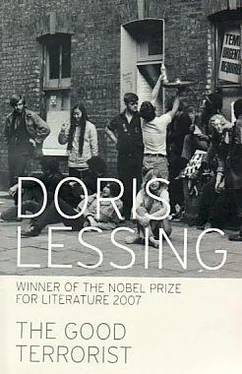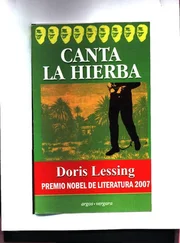Alice stood back away from the trap door up into the attic so that she was out of Philip's sight, and took off her sweat shirt. She slipped the bright dress on over her head. It would not go down past her hips, and stuck in a thick roll around her waist. There being no mirror in the house, she could not see what her arms and shoulders looked like, but she saw her sturdy freckled hands fidgeting at the roll of material, and felt that the dress was laying a claim on her, like an impostor demanding to be recognised. She stripped it off again angrily, and put back the sweat shirt, and with it a feeling of appropriateness and even virtue, as if she had been tempted briefly by the forbidden. She did not try on the apricot chiffon, with panels of silver beads back and front, some of them loosened, some vanished away as though a bead-eating insect had been at it. She held the sage-green lace with its swirling skirt up against her. It was tight above, with a pale-pink vee for modesty in the front, and the back cut down to the coccyx, with another little vee there. And afternoon dresses, the "New Look," quite glossy and good. Who had put them up there, unable to throw them away? Who had forgotten about them and gone off, leaving all those trunks up there? She showed the dresses to Philip, who laughed at them, but when she said she would get something for them, quite a lot, shrugged, unwillingly respectful.
She put them in a suitcase and took the bus to Bell Street, to a shop where her mother, being hard up, had sold some dresses. She had got over a hundred pounds.
Saturday. The markets were crammed. The woman in the shop that sold antique clothes was already busy with a customer who was after a white crepe-de-chine 1920s dress that had gold sequins in thick crusty-looking roses all round the hips. She paid ninety pounds for it. And it had a stain on the shoulder, which she said she would hide with a gold rose.
Alice went forward with her suitcase, saw the woman's eyes narrow in greed as she took in what was there. Alice was determined to get every penny she could. She bargained closely over each garment, watching the woman's eyes, which gave her away. They were clever, narrow eyes, used to poring over small stitches, a tiny rent, the set of a panel of embroidery. When Alice took out the apricot chiffon with the silver beads, she even sighed, and her tongue, which was large and pale, slid over her lips.
For that Alice got sixty pounds, though the woman kept saying a skilled sempstress would have to replace the missing beads, and it would cost - Alice had no idea what it would cost. Alice smiled politely, nodded, and stood her ground.
She went home with £250, knowing that the woman would sell those clothes for four times as much. But she was satisfied.
She was not going to tell Jasper. This meant that loyalty forbade her to tell Philip - who wouldn't have believed her in any case. She told him she had got £150, gave him a hundred, and heard him sigh a little; such a different sigh from that sharp escape of breath of the woman in the shop. Like a child - like Jasper getting into his sleeping bag last night, coming home, to safety.
Well, that would keep things going, but not for long. Philip and she spent sixty pounds of it that afternoon on a second-hand gas boiler. And five pounds for its delivery. By the end of the week there would be hot water. Even heat, if those radiators that had not been stolen had not suffered by their neglect.
Not that Alice cared about warmth, not even after four years in her mother's warm house. She had become used to adapting to different temperatures. Before her mother's house she had gone through a winter in a squat that had no heating at all. She had simply worn a lot of clothes, and kept moving. Jasper had complained, had got chilblains, but even he had put up with it; yet that was one of the reasons he had been pleased to move in to live with her mother's warmth, after a cold winter.
She spent a long evening working with Philip, as his assistant, handing him tools, holding steady the beam of a powerful torch. She watched his deft slender hands bleached by the light, and knew that this one could have been, should be, some kind of fine and meticulous craftsman, should never have to be wrestling with pipes and floorboards that seemed heavier than he was. This, the waste of it, fuelled in her the indignation that kept her going, filled her mind with the thoughts that justified everything she did: one day, it would be impossible that fine people like Philip would be misused, kept down, insulted by circumstances; one day - and because of her, Alice, and her comrades - things would be different.
At midnight, she knew that Jasper would not be coming. Her heart began a small private wailing, which made her ashamed and which she suppressed. She cooked bacon and eggs for Philip, and when he had gone up to sleep, waited, not only for Jasper but for Jim, too. Trouble! She could feel it coming.
Mary and Reggie came in, smiling, and glowing with that special look of the successful demonstrator. Sitting with Alice, drinking coffee, they told her how hundreds had marched against the polluting of a certain stretch of shore. They left Alice with a little pile of pamphlets and leaflets, and, hearing that hot water would soon be among the amenities of this house, Reggie remarked that they must have a talk about finance. But tonight they were ready to drop, must sleep. They went up, very close. They were going to have sex, Alice knew. Well, she would stay down here a bit longer, then.
Mary and Reggie came back down, full of smiles, asking about the clothes, the junk that littered the landings of the top floor. Alice had forgotten she had meant to tidy up, said she would, tomorrow. More smiles, and again the two went upstairs.
And if I don't clear up? thought Alice. Of course they wouldn't! It didn't occur to them! I made the mess, and so I clear up. Oh yes, I know them, I know those two, I know the middle classes.... Fuck them all.
But as she sat on there, thinking of all that rubbish, which would have to be parcelled up, and carried down, and put in the garden, and then taken away by the dustmen, who would have to be paid, a new thought startled her mind. She had, on seeing those exquisite evening dresses, thrown them down through the hatch and scrambled after them. But she hadn't finished examining what was in the attics. There were other cases, trunks, roped bundles up there still. Why, there might be a lot more antique clothes, a lot more money.
She raced upstairs, forgetting all about Mary and Reggie in their room under part of the attic, and shot up the ladder, which was still in position, for Philip had not finished. She turned on his heavy-duty torch. In fact, most of the cases had been opened. But along the edge of the attic, under the low eaves, stood three old-fashioned trunks, of the kind people once took on cruises, "for use on the voyage." They were of some kind of fibre, painted glossy chestnut, now dimmed and dulled, with bands of wood to give them strength. She flung them open, one, two, three, her heart hammering. Inside the first, newspapers. Newspapers? She knelt by the trunk, flinging aside papers, reaching down and down, scrabbling in the corners. Yellow piles of papers, and that was all. Why? What for? What lunatic... The second had newspapers covering books. No special books, no treasures here, only the random collection of some family. Old, faded books. The Talisman, with its brown board cover eaten away. Little Gems from the Bible. Henty. She Loved, and Lost... The Treasure of the Sierra Madre... Crocheting Made Simple. A set of Dickens.
She might get a pound or two for that lot. But there was another case. She opened it prayerfully, saw it was empty except for half a dozen old jam jars rolling around.
A storm of rage shook her. She was on her feet, kicking the trunks, then flinging books, papers, jars, all around the attic, shouting abuse at the people who had left this garbage up here. "Filthy shits," she was yelling. "Fascist shits. I'll kill you, I'll pound... you... to pulp...."
Читать дальше











